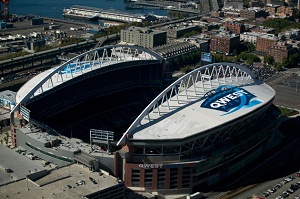Seattle Seahawks pursuing solar installation
 While Seattle isn’t known for its sunny days, its NFL team, the Seattle Seahawks, might want to consider changing their name to the Solarhawks soon. That’s because their home stadium, the Qwest Field and Event Center in Seattle, is now reviewing proposals to install a 600 kilowatt (kW) photovoltaic array to provide some of the stadium’s power needs, which would make it the largest PV installation at a major sports venue in the United States.
While Seattle isn’t known for its sunny days, its NFL team, the Seattle Seahawks, might want to consider changing their name to the Solarhawks soon. That’s because their home stadium, the Qwest Field and Event Center in Seattle, is now reviewing proposals to install a 600 kilowatt (kW) photovoltaic array to provide some of the stadium’s power needs, which would make it the largest PV installation at a major sports venue in the United States.
Qwest Field also is the first major sports venue to use the Solar Electric Energy for Your Stadium or Arena guidebook developed by the Natural Resources Defense Council (NRDC) and the Bonneville Environmental Foundation, which Clean Energy Authority reported last week. The largest to date is the 364 kW PV system installed at the Staples Center in Los Angeles.
Despite Seattle’s reputation as a rainy city, Darryl Benge, assistant general manager and certified facility manager for Qwest Field, told Clean Energy Authority in an exclusive interview that Seattle receives enough sunlight to justify a PV array. He said Bonneville’s research found that an array installed at the location, will “get 90 percent average efficiency on light we get” throughout the year.
“Obviously it’s an opportunity to show to our guests and patrons that photovoltaic power is an option in the northwest,” he said.
Instead of installing PV on the stadium itself the plan is to “install it on the event center attached to the stadium. It’s more practical than the stadium roof,” Benge said. He explained that issues with Qwest Field’s roof, including mounting angles and racking systems, make the event center a better solution. In addition, installing it on the event center will allow event attendees a chance to view the array from certain areas of the stadium, Benge said.
To help publicize the PV system, the plans call for one or more informative kiosks with information like system production data and size. And during events, they will likely publicize the array at the stadium, he added.
First & Goal, Inc., which operates Qwest Field and whose parent company, Vulcan Sports and Entertainment, owns the Seahawks, issued the initial request for proposals (RFP) on Aug. 8. In developing the RFP, Benge explained, the company relied on information in the NRDC/Bonneville guidebook. He said that the plight of the PV system is approaching a “go/no-go decision within the next 45 days.” If the company decides to move forward with the project, he said, construction will start almost immediately after a contract is inked.
Part of the reason for the short timeline between initiating the RFP and the proposed construction start date is so that the company can qualify for ARRA grant monies, Benge explained. He said that if the company pays at least 5 percent of the total array’s costs in 2010, it can qualify for a federal rebate or grant that covers 30 percent of the array’s costs.
Overall, the 600 kW would produce about 10 percent of the stadium’s total energy needs, according to Benge. In addition, it would be tied to the grid under an agreement with Seattle City Light, allowing it to feed power back to the grid when it’s not needed at the stadium.
In the RFP cover letter, First & Goal said “The goal of the project is to maximize overall energy production capacity from the existing roof, while reducing the overall cost per unit of energy produced annually.” And it also “considers this project as a ‘green jobs’ training opportunity for the local workforce.” And it wanted proposals to include apprenticeship and pre-apprenticeship training programs.
First & Goal issued the RFP to nine companies, EC Co., Sequoyah Electric, Western Solar, McKinstry Co., SolarCity, TSMC Solar, Solar Nation, Sunergy Systems and Advanced Energy Systems. In the RFP, the company requested bids for installing and maintaining a 600 kW PV array for 20 years, with the stipulation that the PV system must be able to produce at least 600 kW in its 20th year, Benge explained.
The company has narrowed the list to three companies since issuing the RFP.



